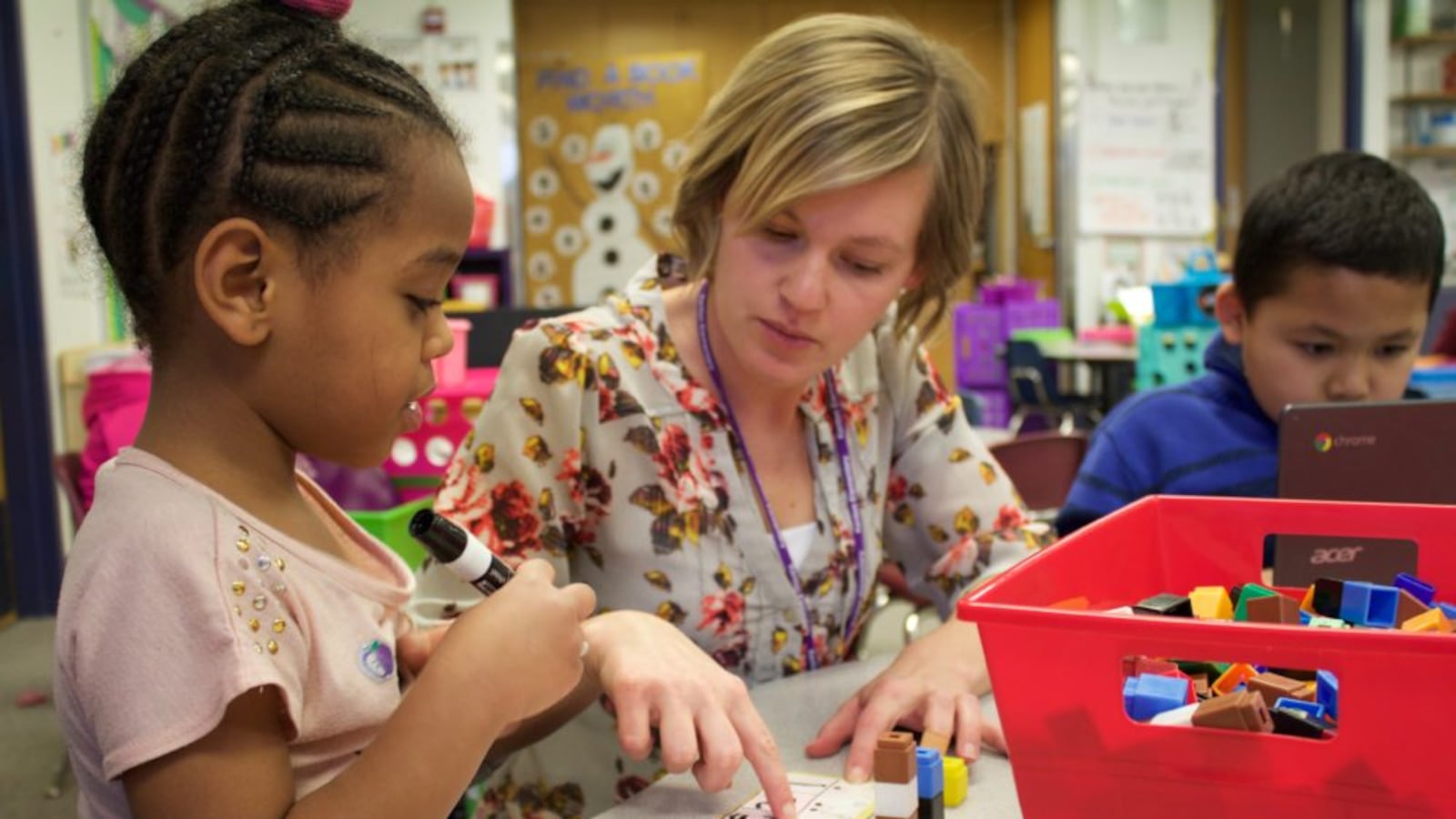Kindergarteners in Aurora’s Kenton Elementary spent an afternoon last week playing math games. Some kids built towers that had to be exactly 20 blocks high. One boy played a game on a laptop doing simple addition. Across the room, the teacher sat with a girl who was counting blocks aloud and practicing writing.
More than halfway through the year, the four and five-year-olds are able to recognize numbers through 50 or even through 100, Kenton officials said.
Now, as Aurora Public Schools searches for ways to cut its 2017-18 budget, free full-day kindergarten like Kenton’s is among one of scores of programs that could fall victim.
“It’s a concern for all of us,” said Heather Woodward, Kenton Elementary’s principal.
Scaling full-day kindergarten back to a half day was one scenario district officials floated when asking for community input on what to prioritize. District officials have said they are not ready to take anything off the table in trying to trim next year’s budget by an estimated $31 million.
Exact cuts will depend on state funding, which won’t be finalized until later this spring, and on how much the district can save through administrative changes like negotiating different health plans for employees. Patti Moon, a district spokeswoman, said cuts could still be presented later this spring.
Earlier this year, the district presented more than 40 budget-cutting ideas at public meetings and through a request for online feedback. The ideas included adding furlough days, cutting middle school sports and changing school schedules. Changing kindergarten to half-day would save the district an estimated $4.9 million.
But the idea got significant pushback. One of the common messages from those who provided the district feedback asked to avoid cutting full-day kindergarten.
“Our Kindergarten students are required to learn a large amount of information by the end of the year,” one response stated. “It’s very hard to get these students to where they are required to be even with a full day of instruction. Taking away a half day of instruction would be a huge injustice to these students.”
The first known budget cut in Aurora will likely come from a decrease in school staff by increasing the ratio of students to staff. Superintendent Rico Munn is scheduled to ask the Aurora school board Tuesday night for guidance on how much to increase the ratios per school.
A final staffing recommendation will be part of the draft budget presented in April.
In Aurora schools, kindergarteners get a daily math lesson in addition to at least an hour of reading or writing, a period of language development and 50 minutes of either art, music, technology or physical education.
Judith Padilla, a mother of three children in Aurora, is adamantly opposed to cutting full-day kindergarten.
“There would be a tremendous impact for parents who have to work,” Padilla said. “For my son it was a great benefit to be in kindergarten a full day so he could develop. He had some learning problems and some language problems and he had special classes to help him learn things like holding a pencil. Now they say he is at his level.”
Woodward, the Kenton principal, said making sure kids leave kindergarten on track to reading by third grade, and to be proficient in English so that they can learn in all their classes, are two major goals for educators.
For kids who leave kindergarten already behind, “we know there’s going to be a continual gap moving forward,” she said.
Bruce Atchison, director of early learning instruction for the Denver-based Education Commission of the States, said his team is doing research on how to get more children to reading proficiency at the end of third grade. Having high-quality full-day kindergarten emerged as one of six policies considered effective for reaching that goal.
“It’s probably the most significant issue for education policy makers,” Atchison said. “Policy makers are typically aware of the abysmal reading proficiency rates across the country. It’s 41 percent of low-income children still are not reading proficiently by the end of third grade. That’s a huge issue.”
In Aurora, 45 percent of kindergarteners are English language learners, and 70 percent or kindergarteners qualify for free or reduced price lunch, a common measure of poverty.
According to 2016 state data, 18.6 percent of Aurora third graders met or exceeded expectations on reading tests compared to 37.4 percent of third graders across Colorado.
In Colorado, the state only pays districts for about a half-day of kindergarten. Districts can choose to pay for the rest, or offer it to families for a fee. In Aurora, the district made full-day kindergarten free for all students after voters approved an increase in taxes in 2008.
Patrick Hogarty, an Aurora teacher and elected delegate for the Colorado Education Association, said even at higher grade levels, teachers are concerned about the lasting impact the kindergarten cuts would have.
“It would be basically catastrophic due to the learning these children need to have,” Hogarty said. “It’s sometimes almost impossible for students to catch up to as they progress through the levels of education.”
In the last few years, districts in Colorado and across the country have moved to add full-day kindergarten programs.
In 2007, about 40 percent of Colorado kids enrolled in full-day kindergarten, according to Atchison. That percentage is now up to 77 percent.
“Districts, principals, education leaders are seeing the advantages of full-day kindergarten,” Atchison said.
The challenge for those that haven’t added the programs is usually the money.
“You are hard-pressed to find policy makers who don’t want full-day programs,” Atchison said. “They understand that children benefit from full day kindergarten programs, but it really comes down to the funding issues.”

